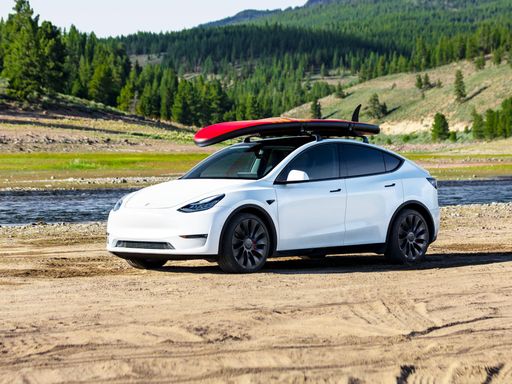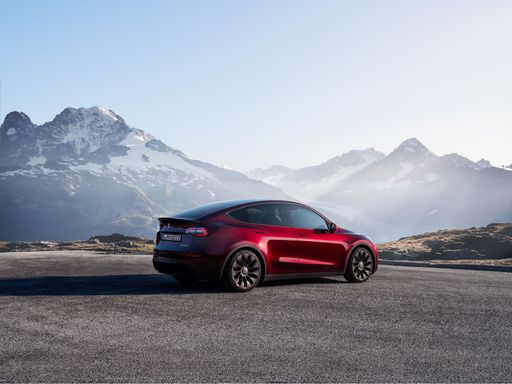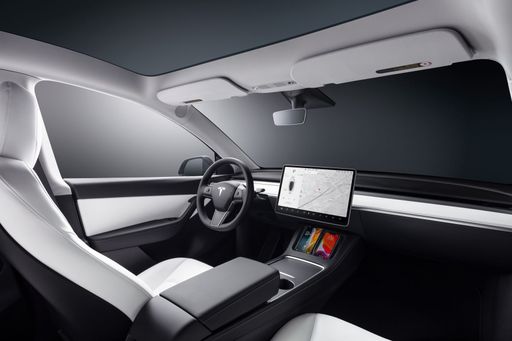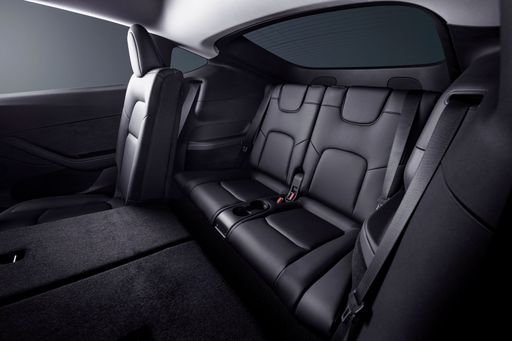Tesla Model Y vs Hyundai Kona – Differences & prices compared
Compare performance, boot space, consumption and price in one view.
Find out now: which car is the better choice for you – Tesla Model Y or Hyundai Kona?
The Tesla Model Y (SUV) comes with a Electric engine and Automatic transmission. In comparison, the Hyundai Kona (SUV) features a Electric, Petrol or Full Hybrid engine with Automatic or Manuel transmission.
When it comes to boot capacity, the Tesla Model Y offers 0 L, while the Hyundai Kona provides 466 L – depending on how much space you need. If you’re looking for more power, decide whether the 514 HP of the Tesla Model Y or the 218 HP of the Hyundai Kona suits your needs better.
In terms of consumption, the values are 13.90 kWh per 100 km for the Tesla Model Y, and 14.60 kWh4.60 L for the Hyundai Kona.
Price-wise, the Tesla Model Y starts at 38600 £, while the Hyundai Kona is available from 23100 £. Compare all the details and find out which model fits your lifestyle best!
Tesla Model Y
The Tesla Model Y stands out in the electric vehicle market with its sleek design and impressive range. Its interior is minimalist yet stylish, offering a spacious cabin that enhances the driving experience. The Model Y also features advanced technology, including an intuitive infotainment system, making it a leader in innovative motoring.
details @ tesla.com
@ tesla.com
 @ tesla.com
@ tesla.com
 @ tesla.com
@ tesla.com
 @ tesla.com
@ tesla.com
Hyundai Kona
The Hyundai Kona blends a bold design with a versatile interior, making it a standout choice in the compact SUV market. Its crisp handling and responsive steering provide an engaging driving experience, whether in the city or on the open road. The vehicle also offers a range of features designed to enhance comfort and connectivity, ensuring a pleasurable journey for both driver and passengers.
details @ hyundai.news
@ hyundai.news
 @ hyundai.news
@ hyundai.news
 @ hyundai.news
@ hyundai.news
 @ hyundai.news
@ hyundai.news

|

|
|
|
|
Costs and Consumption |
|
|---|---|
|
Price
38600 - 45400 £
|
Price
23100 - 41600 £
|
|
Consumption L/100km
-
|
Consumption L/100km
4.6 - 7 L
|
|
Consumption kWh/100km
13.9 - 15.3 kWh
|
Consumption kWh/100km
14.6 - 16.8 kWh
|
|
Electric Range
500 - 622 km
|
Electric Range
377 - 514 km
|
|
Battery Capacity
62.5 - 78.4 kWh
|
Battery Capacity
1.3 - 65.4 kWh
|
|
co2
0 g/km
|
co2
0 - 163 g/km
|
|
Fuel tank capacity
-
|
Fuel tank capacity
38 - 47 L
|
Dimensions and Body |
|
|---|---|
|
Body Type
SUV
|
Body Type
SUV
|
|
Seats
5
|
Seats
5
|
|
Doors
5
|
Doors
5
|
|
Curb weight
1976 - 2072 kg
|
Curb weight
1370 - 1773 kg
|
|
Trunk capacity
0 L
|
Trunk capacity
466 L
|
|
Length
4790 mm
|
Length
4350 - 4385 mm
|
|
Width
1921 mm
|
Width
1825 mm
|
|
Height
1624 mm
|
Height
1580 - 1585 mm
|
|
Payload
-
|
Payload
420 - 490 kg
|
Engine and Performance |
|
|---|---|
|
Engine Type
Electric
|
Engine Type
Electric, Petrol, Full Hybrid
|
|
Transmission
Automatic
|
Transmission
Automatic, Manuel
|
|
Transmission Detail
-
|
Transmission Detail
Manual Gearbox, Dual-Clutch Automatic
|
|
Drive Type
Rear-Wheel Drive, All-Wheel Drive
|
Drive Type
Front-Wheel Drive, All-Wheel Drive
|
|
Power HP
299 - 514 HP
|
Power HP
115 - 218 HP
|
|
Acceleration 0-100km/h
4.8 - 5.9 s
|
Acceleration 0-100km/h
7.8 - 11.9 s
|
|
Max Speed
201 km/h
|
Max Speed
162 - 210 km/h
|
|
Torque
420 - 493 Nm
|
Torque
200 - 265 Nm
|
|
Number of Cylinders
-
|
Number of Cylinders
3 - 4
|
|
Power kW
220 - 378 kW
|
Power kW
85 - 160 kW
|
|
Engine capacity
-
|
Engine capacity
998 - 1598 cm3
|
General |
|
|---|---|
|
Model Year
2025
|
Model Year
2024 - 2025
|
|
CO2 Efficiency Class
A
|
CO2 Efficiency Class
A, D, C, E, F
|
|
Brand
Tesla
|
Brand
Hyundai
|
Tesla Model Y
Revolutionising the SUV Market: Introducing the Tesla Model Y
The Tesla Model Y has emerged as a trailblazer in the electric vehicle market, combining innovative technology with practicality to redefine what an SUV can offer. With its sleek design and exceptional performance, it's no surprise that this model is capturing the attention of car enthusiasts and eco-conscious drivers alike.
Unparalleled Performance and Efficiency
At the heart of the Tesla Model Y lies its impressive range of power and efficiency options. With power ratings from 299 to 534 PS, the Model Y offers something for every driver. It boasts an impressive electric range from 455 to 600 km, allowing drivers to embark on long journeys with confidence.
An advanced lithium-ion battery, with capacities ranging from 62 to 79 kWh, powers this remarkable vehicle. This ensures not only a robust performance but also efficiency, with consumption figures between 14.9 kWh and 17.3 kWh per 100 km, making it a leader in its class.
Advanced Technology and Safety
Tesla is renowned for its technology-forward approach, and the Model Y is no exception. It features the state-of-the-art Autopilot system, designed to assist with driving and to enhance safety on the road. This includes features such as adaptive cruise control, lane detection, and automatic lane-keeping, which work seamlessly to reduce driver fatigue and improve overall road safety.
The Model Y has achieved a superb CO2-Effizienzklasse rating of A, reflecting its zero-emissions performance, thanks to its fully electric powertrain. This aligns perfectly with Tesla's mission of accelerating the world’s transition to sustainable energy.
Design and Comfort
One glance at the Tesla Model Y, and it is clear that it combines utility with elegance. This SUV offers ample space, marked by a large interior and a boot capacity of 854 litres, making it an ideal vehicle for both family and leisure activities. However, the Model Y does not sacrifice aesthetics for practicality, embodying a minimalist and aerodynamic design that stands out on any road.
Inside, the focus is on comfort and connectivity. The Model Y features a panoramic glass roof, spacious seating for five, and a central 15-inch touchscreen that controls most in-car functions. This screen serves as the central hub for navigation, media, and communication systems, further highlighting Tesla's commitment to integrating sophisticated technology.
Final Thoughts: A Game-Changer in Electric SUVs
The Tesla Model Y is more than just an electric vehicle; it is a testament to what the future of driving looks like. From its performance capabilities to its innovative technology and design, the Model Y continues to set benchmarks in the automotive industry.
For those looking to combine sustainability with performance, the Model Y offers such an opportunity in an attractive package. It is not just a vehicle; it's a statement of forward-thinking mobility and advanced engineering, paving the way for the next era of automotive excellence.
Hyundai Kona
The Hyundai Kona: A Comprehensive Overview
The Hyundai Kona has established itself as a standout in the compact SUV segment, blending innovation with performance and style. As the automotive world moves towards more sustainable and efficient options, the Kona offers a variety of powertrains, from traditional petrol engines to full hybrids and all-electric models.
Powertrain Options and Performance
The Hyundai Kona's powertrain choices cater to a wide range of preferences. For petrol enthusiasts, the Kona offers a 1.0L T-GDI engine, delivering 100 PS, and a more robust 1.6L T-GDI variant with up to 170 PS. Those looking for efficiency without sacrificing power can consider the full hybrid model, offering 129 PS and an impressive consumption of 4.5 L/100km.
For a greener option, the all-electric Kona provides a compelling case. With battery capacities of up to 65.4 kWh, the electric Kona offers power outputs of 156 to 218 PS, and efficiencies as low as 14.6 kWh/100km, enabling an electric range of up to 513 km.
Technical Specifications and Innovations
Built on a robust platform, the Kona delivers versatility and reliability. With a choice between manual or dual-clutch automatic gearboxes, along with options for front-wheel or all-wheel drive, the Kona ensures a tailored driving experience. The handling is enhanced by the car's lightweight construction, balancing a 1370 to 1773 kg curb weight with dynamic performance.
The Kona's design doesn't compromise cargo space for style; it offers a generous 466 L boot capacity. With a relatively compact body, measuring 4350 to 4385 mm in length, the Kona easily navigates urban environments while still commanding a strong road presence with its 1825 mm width.
Efficiency and Eco-Friendliness
Hyundai is committed to reducing emissions, as evidenced by the Kona's CO2 efficiency ratings, which range from class A for electric models to class D for some higher-performance petrol variants. The focus on reducing environmental impact without sacrificing driving pleasure is notable throughout the Kona range.
Costing and Value
The Hyundai Kona offers commendable value for money. Pricing starts at €26,400 and reaches up to €50,690, depending on the chosen configuration. The monthly running costs range from €956 to €1090, with a cost per kilometre of 38.3 to 43.6 cents, making it a competitive option in its class.
Conclusion: Modern, Efficient, and Versatile
The Hyundai Kona stands as a testament to Hyundai's commitment to innovation, efficiency, and practicality. Whether you are inclined towards a traditional combustion engine, a hybrid for a balance of power and efficiency, or a full electric model for maximum eco-friendliness, the Kona provides a tailored solution for each unique driver preference.
Which drive types are available for the Tesla Model Y?
Available as Rear-Wheel Drive or All-Wheel Drive.
The prices and data displayed are estimates based on German list prices and may vary by country. This information is not legally binding.
